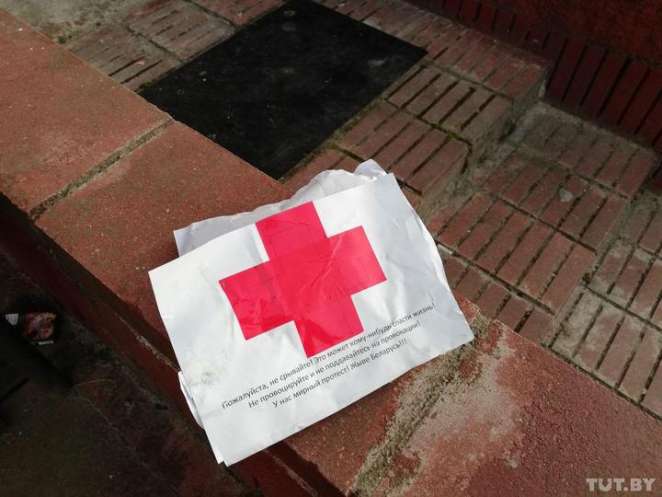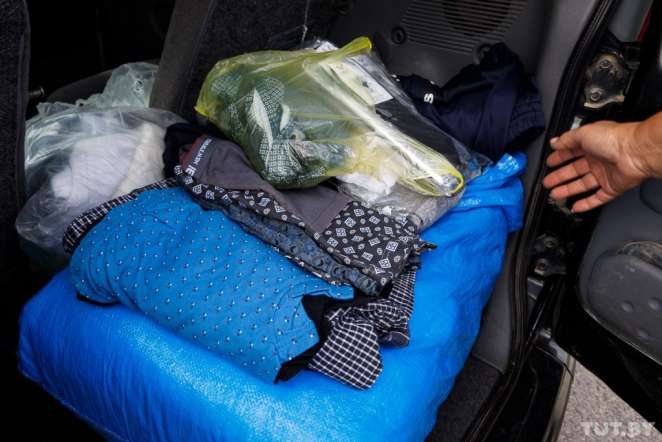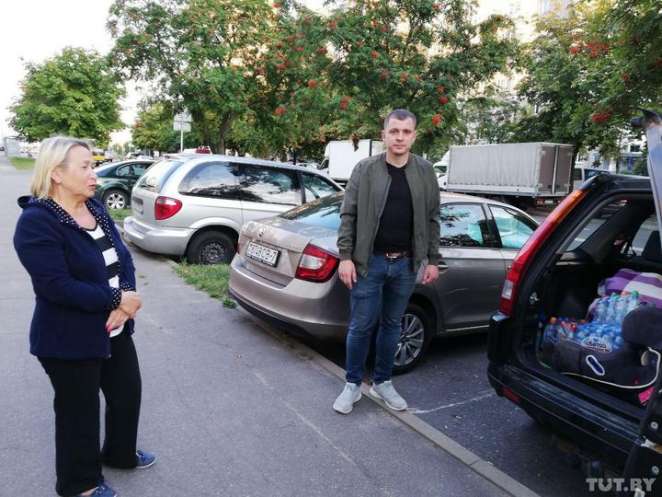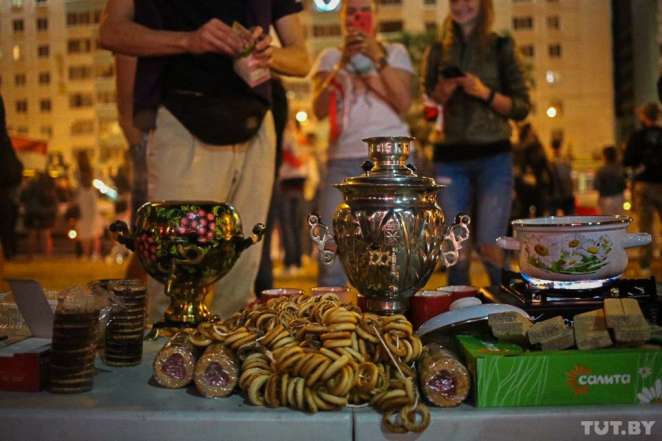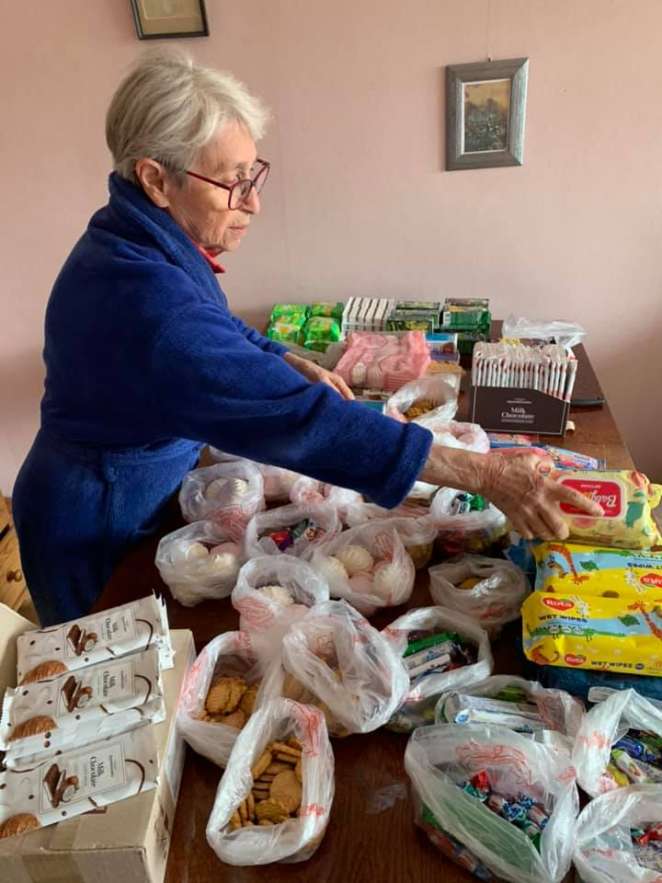How Pensioners, IT Specialists And Ordinary Belarusians Help Injured Detainees
Belarusfeed
23 August 2020, 15:03
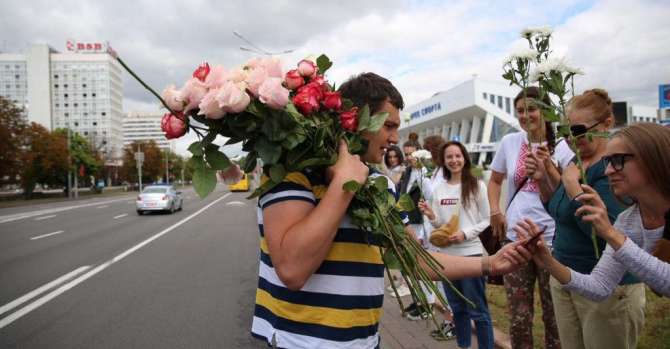 “We arrived at Okrestin (a detention centre in Minsk) at midnight and was driving people home until 7 am,” describes one of her August nights Kristina Bugayenko. Thousands of Belarusians are now trying to help those affected by violence during and after the protests, and support other concerned people standing in chains of solidarity for hours.
“We arrived at Okrestin (a detention centre in Minsk) at midnight and was driving people home until 7 am,” describes one of her August nights Kristina Bugayenko. Thousands of Belarusians are now trying to help those affected by violence during and after the protests, and support other concerned people standing in chains of solidarity for hours.
When riot police started grabbing random passers-by in the courtyards of residential buildings in Minsk, many people who lived there stopped closing entrance doors at night. Codes to unlock the doors were shouted from the windows during the “hapun” (*sudden and often illegal detention of a person present in the area without examining if the one is guilty).
This is how people tried to hide and protect those fleeing riot police brutality after peaceful post-election protests.
Then self-made first-aid kits appeared here and there with bandages and first aid medications inside. Belarusians also don’t forget about those standing in chains of solidarity. They keep bringing them coffee, water, sweets and flowers, or just try to to cheer them up with kind words and funny posters.
Watch two videos below to feel the atmosphere on the streets in the last few weeks.
For several days after the protests, patients of the emergency care hospital received water, napkins, juice, tampons, diapers – the list could go on and on. Elena Tkacheva, a 59-year-old entrepreneur from Zhdanovichi market in Minsk, brought them clothes.
“I asked friends who work in a second-hand store market whether they waned to help. And you should have seen the way people gathered clothes. Not only second-hand clothes, but also new ones. Take it, they said, we’ll give you a bagful. Customers also joined, they bought pants, underwear, so I could bring them to the hospital.”
On the way back from the emergency care hospital, Elena “did not see the road” because she couldn’t stop crying.
“How could you torture people? If you want to punish them, fine them or do something else… But why do you beat them so badly?! Even those who were loyal to the government are now furious. I can’t watch these lies on TV anymore. We have wonderful people. The doctor told me that the patients have more than enough food, employees of one IT company brought it.”
Vlad Ostrovsky works in a big IT company. The 28-year-old dropped everything to drive the detainees released from Okrestin detention center home. He slept only a couple of hours but he doesn’t complaine. This is a conscious choice of many volunteers, he explaines.
On the night of 13-14 August, the authorities reported that they would release the detained during the protests. Then Belarusians spread the information and asked for help in social networks and Telegram channels – hundreds rushed to help.
“There were traffic jams on the way to Okrestin detention center at Prospekt Dzerzhinskogo. There were many drivers. I even had to ask some of them to go home, because such a flow complicated coordination and annoyed the officers of the detention center,” says Vlad.
![How Pensioners, IT Specialists And Ordinary Belarusians Help Injured Detainees]()
Volunteers are trying to comply with the requirements of the detention centre staff. They don’t wear any national or protest symbols, don’t clap, don’t shout slogans, don’t enter the roadway or block special transport, and keep a 300 meters distance from the gates of the facility.
“Our volunteer initiative was spontaneous. Relatives of the detainees were standing near Okrestin detention center for hours, it was heartbreaking to look at them. They were very worried and still had to remain in an information vacuum, begging police to give them any details on the whereabouts of their loved ones.
Gradually, people started coming and offering help: some brought water, food and medicines, others brought warm clothes and blankets, chairs and tables, office supplies. Some people offered to draw up lists, provide psychological and first aid, or coordinate processes. There are times when you just can’t stay at home. Otherwise, it feels like you are betraying your views, values, and beliefs.
There were many reports that hospitals where the detainees were treated need help. And when volunteers came there, it turned out that there was simply no place for stuff they brought. We recieved messages that there were not enough volunteers in Zhodino or Slutsk. We went there and saw kilometer-long queues of locals willing to help.”
Kristina Bugayenko, a 27-year-old tour guide, and her husband were also driving people to their homes and hospitals that night.
“We saw on Instagram that drivers are needed, so we decided to go. We arrived at Okrestin at midnight and were driving people home until seven in the morning on 14 August. Those released from the detention center on Okrestin street were in normal state. They said that they were beaten, but it was tolerable.
But people who were kept in prison cells told the most horrible things. Out of five men we were driving around, only one of them was an actual protester! The rest were random passers-by. For instance, two barmen from Zybitskaya street were grabbed and put into a police wagon when they were walking from work. It’s terrible.”
People bring chocolate, juice boxes, cookies, napkins and other stuff to Evdokia Chekulayeva. The 84-year-old Minsker sorted and packed up food for people injuired and hospitalised during and after the protests. Explaining why she сouldn’t remain passive, she says: “Because there are betrayal, pain, injustice, bitterness, and lies all around.
“It was not my idea. My daughter came and said: ‘Come on, mom, they’ll bring you food, and you can put it in packages.’ Of course, I agreed. I know that even mobile canteens were arranged somewhere. I haven’t had much contact with people lately, I’ve been retired for a long time. And now so many people came in one day and brought so many big bags!”
Valery Borisenko, a 34-year-old owner of the Point Minsk Hostel, made eight of the 12 rooms temporarily unavailable for booking, so that people released from detention centres had a place to spend a night. The crackdown on the protesters affected foreign visitors as well. A guest from China went for a walk on 9 August and disappeared.
“We were looking for him together with a girl from Germany, who is also visiting us. We called the department of foreign affairs, the embassy, the police – no to avail. Turned out that the guy was detained. On 14 August, he returned with the police for his passport. When he gets back, I’ll offer him to stay here for free till he recovers. “
Valery adds that there is no queue of those who need help at the hostel, however, he stresses, it is not about the numbers.
“A woman who came from Gomel to Minsk looking for her son spent a night here. We were ready to help her even longer, but she found him pretty quickly, spent only one night here and left. I can say that people abroad also see the Belarusian wave of solidarity. Our former guests text me, they admire the cohesion and kindness of the people despite the government’s opression.”
23 August 2020, 15:03

A man is giving out flowers to the women standing in a chain of solidarity in Minsk
Homemade first aid kits and superheroes in queues
When riot police started grabbing random passers-by in the courtyards of residential buildings in Minsk, many people who lived there stopped closing entrance doors at night. Codes to unlock the doors were shouted from the windows during the “hapun” (*sudden and often illegal detention of a person present in the area without examining if the one is guilty).
This is how people tried to hide and protect those fleeing riot police brutality after peaceful post-election protests.
First-aid kits at Kamennaya Gorka metro station
Then self-made first-aid kits appeared here and there with bandages and first aid medications inside. Belarusians also don’t forget about those standing in chains of solidarity. They keep bringing them coffee, water, sweets and flowers, or just try to to cheer them up with kind words and funny posters.
Watch two videos below to feel the atmosphere on the streets in the last few weeks.
Clothes and tears
For several days after the protests, patients of the emergency care hospital received water, napkins, juice, tampons, diapers – the list could go on and on. Elena Tkacheva, a 59-year-old entrepreneur from Zhdanovichi market in Minsk, brought them clothes.
“I asked friends who work in a second-hand store market whether they waned to help. And you should have seen the way people gathered clothes. Not only second-hand clothes, but also new ones. Take it, they said, we’ll give you a bagful. Customers also joined, they bought pants, underwear, so I could bring them to the hospital.”
On the way back from the emergency care hospital, Elena “did not see the road” because she couldn’t stop crying.
Clothes from the entrepreneurs of Zhdanovichi market
“How could you torture people? If you want to punish them, fine them or do something else… But why do you beat them so badly?! Even those who were loyal to the government are now furious. I can’t watch these lies on TV anymore. We have wonderful people. The doctor told me that the patients have more than enough food, employees of one IT company brought it.”
Help coming from everywhere
Vlad Ostrovsky works in a big IT company. The 28-year-old dropped everything to drive the detainees released from Okrestin detention center home. He slept only a couple of hours but he doesn’t complaine. This is a conscious choice of many volunteers, he explaines.
On the night of 13-14 August, the authorities reported that they would release the detained during the protests. Then Belarusians spread the information and asked for help in social networks and Telegram channels – hundreds rushed to help.
“There were traffic jams on the way to Okrestin detention center at Prospekt Dzerzhinskogo. There were many drivers. I even had to ask some of them to go home, because such a flow complicated coordination and annoyed the officers of the detention center,” says Vlad.
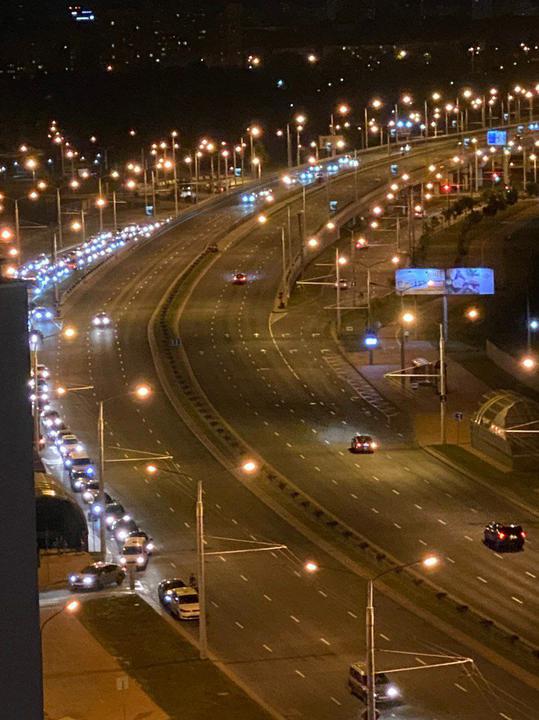
The queue of cars on the way to Okrestin detention center on the night of 13-14 August. These are relatives of the detainees and volunteers.
Volunteers are trying to comply with the requirements of the detention centre staff. They don’t wear any national or protest symbols, don’t clap, don’t shout slogans, don’t enter the roadway or block special transport, and keep a 300 meters distance from the gates of the facility.
“Our volunteer initiative was spontaneous. Relatives of the detainees were standing near Okrestin detention center for hours, it was heartbreaking to look at them. They were very worried and still had to remain in an information vacuum, begging police to give them any details on the whereabouts of their loved ones.
Gradually, people started coming and offering help: some brought water, food and medicines, others brought warm clothes and blankets, chairs and tables, office supplies. Some people offered to draw up lists, provide psychological and first aid, or coordinate processes. There are times when you just can’t stay at home. Otherwise, it feels like you are betraying your views, values, and beliefs.
There were many reports that hospitals where the detainees were treated need help. And when volunteers came there, it turned out that there was simply no place for stuff they brought. We recieved messages that there were not enough volunteers in Zhodino or Slutsk. We went there and saw kilometer-long queues of locals willing to help.”
Kristina Bugayenko, a 27-year-old tour guide, and her husband were also driving people to their homes and hospitals that night.
“We saw on Instagram that drivers are needed, so we decided to go. We arrived at Okrestin at midnight and were driving people home until seven in the morning on 14 August. Those released from the detention center on Okrestin street were in normal state. They said that they were beaten, but it was tolerable.
But people who were kept in prison cells told the most horrible things. Out of five men we were driving around, only one of them was an actual protester! The rest were random passers-by. For instance, two barmen from Zybitskaya street were grabbed and put into a police wagon when they were walking from work. It’s terrible.”
This is what a peaceful Belarusian protest looks like when it is not dispersed by riot police. On the night of 15 August, volunteers brought a samovar and sweets to the Pushkinskaya metro station for people standing in a solidarity chain. A raspberry jam was a real hit. This is a reference to one of the most popular Lukashenko-related jokes. Once during the press-conference he offered a cup of tea with a raspberry jam to journalists after one of them wanted to ask him “a tricky question”)
“Mom, they will bring food and you pack it up.”
People bring chocolate, juice boxes, cookies, napkins and other stuff to Evdokia Chekulayeva. The 84-year-old Minsker sorted and packed up food for people injuired and hospitalised during and after the protests. Explaining why she сouldn’t remain passive, she says: “Because there are betrayal, pain, injustice, bitterness, and lies all around.
Evdokia Chekulaeva is sorting sweets in package for patients of the emergency care hospital
“It was not my idea. My daughter came and said: ‘Come on, mom, they’ll bring you food, and you can put it in packages.’ Of course, I agreed. I know that even mobile canteens were arranged somewhere. I haven’t had much contact with people lately, I’ve been retired for a long time. And now so many people came in one day and brought so many big bags!”
Hostel rooms for the affected
Valery Borisenko, a 34-year-old owner of the Point Minsk Hostel, made eight of the 12 rooms temporarily unavailable for booking, so that people released from detention centres had a place to spend a night. The crackdown on the protesters affected foreign visitors as well. A guest from China went for a walk on 9 August and disappeared.
“We were looking for him together with a girl from Germany, who is also visiting us. We called the department of foreign affairs, the embassy, the police – no to avail. Turned out that the guy was detained. On 14 August, he returned with the police for his passport. When he gets back, I’ll offer him to stay here for free till he recovers. “
Valery adds that there is no queue of those who need help at the hostel, however, he stresses, it is not about the numbers.
“A woman who came from Gomel to Minsk looking for her son spent a night here. We were ready to help her even longer, but she found him pretty quickly, spent only one night here and left. I can say that people abroad also see the Belarusian wave of solidarity. Our former guests text me, they admire the cohesion and kindness of the people despite the government’s opression.”
